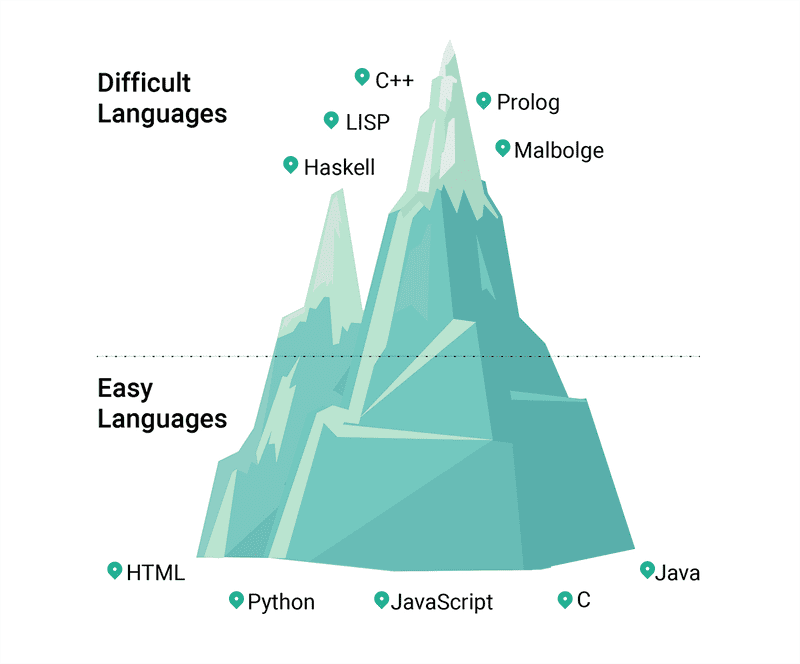Is It Easy to Learn C# After C++
Sakshi Gupta | 5 minute read | July 8, 2020
In this article
- Easy programming languages
- Hard programming languages
- What's the best programming language to learn?
If you want to learn to code, which programming language should you start with? Here are the top 5 easiest and top 5 hardest programming languages.
What's the easiest programming language to learn? What about the hardest programming language?
Asking a programmer about the easiest language to learn is like asking someone about their favorite ice cream. Everyone has a preference and there is no real right answer. As developer and educator Marek Zaluski once suggested, "Programming languages are created by programmers, for programmers." Almost like an insider secret that only a select few know. This can make it intimidating for those who are new to the field of software engineering.
On the other hand, without mastering the popular programming languages, you can't become a great software engineer. In this article, we'll identify and compare the easiest programming languages with high-level programming languages. We'll also identify new programming languages, open-source programming languages, and which languages are in high demand.
Easy programming languages
1. HTML
Hypertext Markup Language (HTML) is the language that is used to code most web pages. It uses tags and elements to define how text, images, and interactive forms can be displayed. HTML is often supported by Cascading Style Sheets (CSS) to define sophisticated styles; and JavaScript for scripting programs. Its ease of use makes it an ideal language for new coders.
It is easy to learn because:
- It has a simple structure with human-readable opening and closing tags
- You can use a WYSIWYG editor and watch the code change in the split view
- You can find and fix bugs easily
2. JavaScript
Along with HTML and CSS, JavaScript makes the internet. Front-end development swears by it. Using libraries like React and jQuery and frameworks like Angular, you can solve the web's most complex problems. With Node.js, you also have server-side code covered.
It is easy to learn because:
- It is made for non-programmers and is beginner-friendly. It is an ideal first programming language
- It is so widespread that most browsers serve as default environments
- You don't need a compiler to see JavaScript in action and can see results instantly
- JavaScript has a large community that's helpful to new coders
3. C
C is a general-purpose language that most programmers learn before moving on to more complex languages. From Unix and Windows to Tic Tac Toe and Photoshop, several of the most commonly used applications today have been built on C.
It is easy to learn because:
- A simple syntax with only 32 keywords
- Data structures are easy to understand
4. Python
A successor to the ABC language, Python is a high-level general-purpose programming language. Python is a favorite among web developers, data scientists, ML/AI professionals, and embedded application developers.
It is easy to learn because:
- The language is obsessive about code readability, often using English language words
- It's known for its generous use of whitespace, making it less intimidating
- It has several libraries for various applications
- It is supported by a huge community of programmers, who likely have the answer for all your questions
Get To Know Other Software Engineering Students

Matthew Dillon
Front End Developer at LaunchBadge
Read Story

Pritisha Kumar
Software Engineer at Dialpad
Read Story

Dave McConeghy
Software Engineering Career Track Student at Springboard
Read Story
5. Java
Java is a class-based, object-oriented general-purpose programming language. It is designed to function across environments—write once, run anywhere (WORA). It is one of the most popular languages among back end developers and security applications.
It is easy to learn because:
- An intuitive syntax that's concise and beginner-friendly
- It is a structured language, leaving little room for deviation
- If you have prior experience with object-oriented programming, it is even easier

Hard programming languages
1. C++
C++, an extension of C—which we said was an easy language to learn—is a general-purpose programming language. Google Chromium browser, several Microsoft applications, and even financial modeling at Morgan Stanley are said to be done with C++.
It is hard to learn because:
- It has complex syntax to support versatility
- It is a permissive language—you can do everything that's technically possible, even if not logically right
- It is best learned by someone who already has a foundation with C programming
2. Prolog
Prolog is one of the first logic programming languages, now seeing adoption in artificial intelligence applications and natural language processing.
It is hard to learn because:
- It is an unconventional language, its data structures are unlike other programming languages
- It requires an unreasonably competent compiler
- It forces the programmer to think hard about their logic upfront
- Online resources and Prolog code can't be applied to your needs without thought
3. LISP
It is the second oldest programming language after FORTRAN, and is still used in higher-level systems and for artificial intelligence.
It is hard to learn because:
- Its is a fragmented language with domain-specific solutions
- Syntaxing in LISP extensively uses parentheses which can be difficult to get used to
4. Haskell
Haskell is a polymorphically statically typed, purely functional language that is built on lambda calculus. Named after mathematician Haskell B Curry, it is primarily used in research, industrial applications, and teaching.
It is hard to learn because:
- It follows a 100% functional paradigm, unlike most modern languages which accept imperative commands
- It is difficult to understand the nuances of compilation and error fixing in Haskell
- It involves intense use of jargon, which might put off beginners
5. Malbolge
Named after the eighth circle of Hell in Dante's Inferno, Malbolge is an example of "esolang" (esoteric programming language). It took two years for the first Malbolge program to be written. Other languages in this category are INTERCAL and Cow, which you might take up only as a challenge.
It is hard to learn because:
- It uses an obscure notation
- Not many programmers spend time learning it, hence fewer learning resources
- It is a self-modifying language that results in erratic behavior
What's the best programming language to learn?
The internet and social communities have given access to a world of resources to learn whatever we aspire to, including some of the world's hardest programming languages. But choosing to learn the easy thing is like plucking the lowest hanging fruit. Its reach doesn't automatically mean reward.
If you're looking to learn a programming language, start with its usefulness. If you want to build a career in software development, web development, mobile app development, or even game development, HTML is a good place to start. For big data and data science, Python might be your best bet. Thankfully though, the languages that are most popular—C, Java, and Python—are fairly easy to learn.
Since you're here…
Considering a career in software engineering? We'll help you build a CV that rivals experienced software engineers in 9 months flat with our Software Engineering Bootcamp. If you're still mulling, try our free software engineering learning path and check out our salary guide to see what you could be making.
Source: https://www.springboard.com/blog/software-engineering/top-programming-languages/